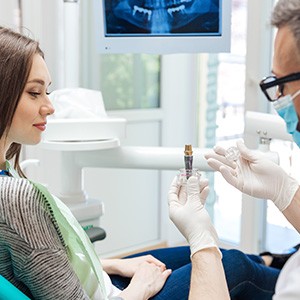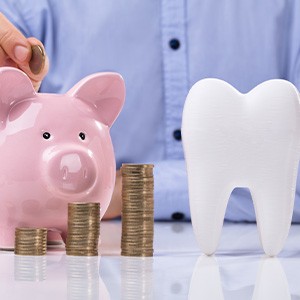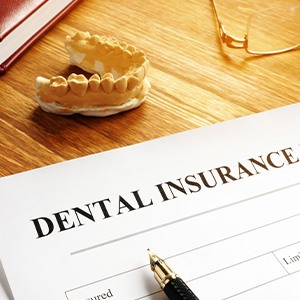Dental Implants — Rowley, MA
The Modern Way to Replace Teeth

Tooth loss can be a devastating experience, but patients don’t have to struggle with it forever. Dr. J. Peter St. Clair and his accomplished staff are proud to offer dental implants in our Rowley, MA dental office as a reconstructive solution that rises above and beyond the rest restoring health, rebuilding structure, and giving patients back an aesthetically pleasing, lifelike look. Contact our Rowley dental office today to schedule a consultation and learn more about the modern way to replace teeth.
Why Choose J. Peter St. Clair, DMD For Dental Implants?
- Advanced Dental Technology for Precise Treatment
- Partnered with the Best Local Specialists
- Replace Any Number of Teeth for Life
What Are Dental Implants?

Dental implants are quickly becoming the most popular way to replace missing teeth, and they are widely regarded as the gold standard. The success of implants is built on the fact that they replicate the entire structure of the tooth, not just the white crown you can see. While dentures and dental bridges only replace the crowns of missing teeth, a dental implant is a small titanium post that is inserted into the jawbone. Your new “tooth roots” work just like the old ones did – they stimulate the jawbone and keep it full and healthy over the years, preventing the facial deterioration that can occur with more traditional tooth replacement options. One or more dental implants can be used to support dental crowns, a bridge, or denture to replace any number of missing teeth. Once the custom-made porcelain restoration is anchored in place, the results will look, feel, and function just like natural.
The 4-Step Dental Implant Process

Although each patient’s implant journey is unique and personalized, treatment generally follows this basic outline: consultation, surgery, osseointegration and abutment, and then restoration. Each of these steps is critical to have successful implants, but don’t worry! We’ll be there to navigate you through the process and help you achieve your goal of a whole smile again. If you are unsure about any of these steps, don’t hesitate to reach out to us, and we’ll schedule an appointment to talk about it.
Initial Dental Implant Consultation

First, we’ll need to meet with you for a consultation to see if dental implants are a good choice for you, or if you’ll need to complete preliminary procedures like a bone graft or gum disease treatment beforehand. During this appointment, we can also answer your questions about dental implants, provide a general estimate for the cost and timeline, and give you the name and information of the specialist we’ll refer you to for the surgery.
Dental Implant Surgery

After our team has determined that you’re a good candidate for dental implants, the next step of the process is to place them into your jawbone. We’ll refer you to a trusted local specialist to ensure that this part of your dental implant treatment goes as smoothly and successfully as possible. During the procedure, a few incisions will be made in the gums, and the implant posts inserted. Make sure you budget at least a couple of days to recover from this surgery.
Dental Implant Osseointegration & Abutment

Once your new implants are placed, patients will need to undergo a healing process. During this time, your natural bone and tissue are able to form a bond with the implant, creating a strong foundation that will support new replacement teeth. This is called osseointegration, and it often takes several months. In many cases, patients attend a follow-up procedure, during which abutments will be added. These will actually attach the restoration to the implants themselves.
Delivery of Dental Implant Restoration(s)

When the abutments are bonded, you will return to our office to get impressions for your restoration(s). These are taken by pressing a putty-like substance against your upper and lower arches. The putty hardens, creating a mold for the dental lab. Technicians use this mold to craft your custom restoration(s), which will fit your mouth comfortably and precisely. For your final appointment, we’ll secure your new teeth into place. At that point, you are free to enjoy your complete smile again!
Who Dental Implants Can Help

Our dental implant dentist in Rowley is here to help all patients suffering from tooth loss achieve the smile of their dreams. While traditional prosthetics may be options for tooth replacement, they’re not the only solutions available. It is true that dental implants are possible for any adult with one or more missing teeth, and our team will go to great lengths to ensure your oral anatomy is strong and capable of receiving these titanium prosthetics when it comes time for placement.
Who is a Good Candidate for Dental Implants?

The only way to know if you are a good candidate for dental implants is to undergo a thorough consultation with Dr. St. Clair. This visit will entail many different parts, each critically important to the overall process.
We must evaluate your smile to determine:
- Your oral health – Are you exhibiting symptoms associated with decay or damaged teeth (i.e., cavities, gum disease)? If so, you’ll need periodontal therapy or tooth extraction if severe enough.
- Your overall health – Are you healthy enough to undergo minor oral surgery, which is required for dental implant placement?
- Your jawbone – Do you have enough jawbone density to adequately support your new teeth? If not, you will likely need a bone graft.
Missing One Tooth

One of the greatest aspects of dental implant placement is that it’s extremely versatile. When only one tooth is missing, there’s no need to consider a bridge. Instead, you can remove yourself from the millions of people living without one natural tooth and embrace the ability to eat, speak, and smile with greater ease. Using a titanium post, we can fill in the socket and allow it to fuse with the bone tissues before securing a dental implant crown.
Missing Multiple Teeth

If two or more teeth are missing along the upper or lower arch, we can place two dental implants on the outer parts of the gap before allowing the remainder of the prosthetic to rest on top of the gums. Not only does this complete your smile, but it also allows you to keep more of your natural tooth structure as opposed to a traditional dental bridge.
Missing All Teeth

Missing an entire arch of teeth can be devastating. However, with the help of implant dentures, which is no longer the case. We can position and place between four and six dental implants so that your new denture will rest on top, creating a stable and fully functional smile. Unlike traditional dentures that require denture adhesives, implant dentures are secured to the top of your implants to maximize durability.
The Benefits of Dental Implants

Dental implants have an amazing success rate of over 95%! However, it’s important that you are implementing all of the right steps to care for them. When maintained properly, here are some of the benefits that you can enjoy every day, in your health, and in the long term.
Day-to-Day Benefits

Dental implants look and feel just like natural teeth, so you shouldn’t notice much of a difference between them in your day-to-day life. Here are a few benefits you can experience every day:
- Bite Force: Dental implants provide additional stability, so you don’t need to shy away from tougher foods. You can expect the return of up to 90% of your natural bite force.
- Easy Maintenance: Implants can be treated just like natural teeth, with no changes to your diet or oral hygiene routine required.
- Increased Confidence: Dental implants blend in seamlessly with the rest of your smile, so they will look just like your natural teeth. You can enjoy a newfound confidence.
Health Benefits

In addition to daily benefits, your health will be positively affected by your dental implants. Here are some health benefits you can look forward to:
- Improved Oral Health: Dental implants help to prevent additional oral health issues from arising, like gum disease and further tooth loss.
- Better General Health: Having excellent oral health will positively influence your general health. It lowers your risk of serious medical conditions, like diabetes and cardiovascular disease.
- Prevention of Bone Loss: Dental implants stimulate the jawbone, preventing bone loss from occurring over time.
Long-Term Benefits

When you choose dental implants, you are investing in the future of your smile. Here are some of the advantages that you can enjoy many years down the road:
- Long-Lasting: With a great oral hygiene routine at home and regular checkups, patients expect to enjoy their implants for 20 more years, 30 more years, or even for the rest of their lives.
- Successful: Dental implants have an amazing success rate of over 95%! Failure is very unlikely.
- Save Money: You don’t need to worry about buying adhesives or soaking solutions when you have dental implants. They also don’t require frequent repairs or replacements. On top of that, dental implants help to reduce your risk of developing additional oral health issues, so you can have time, discomfort, and money!
Understanding the Cost of Dental Implants

As you look into dental implants, don’t forget to consider their price. Your final treatment won’t do you much good if it doesn’t fit your budget. With that said, you should consult our dentist for a precise estimate; the cost of dental implants varies by patient. Our team will then work with you to make care affordable, guiding you through pricing factors, dental insurance, and more. For further details, please keep reading or call us in the coming days.
Preliminary Treatments & Dental Implant Surgery

There’s a good chance you’ll need other dental work before dental implant surgery. Such procedures – tooth extraction, gum disease therapy, etc. – would add to your final expense, though they could prove crucial to treatment success. The upside is that many of these “extras” are partly covered by dental insurance.
Also, note that dental implant surgery incurs its own price. Depending on factors like implant location, sedation, and the head dentist, placement can be costly or not. Still, rest assured you’ll get amazing results regardless; we partner with local specialists to ensure your restoration goes well.
The Parts of Your Dental Implant

Naturally, the parts and features of dental implants also affect their cost. These include the following:
- Implant Number – If your treatment places many dental implants, it’ll inevitably cost more.
- Final Restoration Type – Note that dental crowns, bridges, and dentures have distinct costs.
- Implant Size/Material – Longer dental implants cost more than shorter ones. Similarly, those made of high-grade zirconia are pricier than those made from standard titanium.
- Implant Brand – Because different manufacturers make dental implants differently, an implant post’s brand also affects its final cost.
How Dental Implants Pay for Themselves

While dental implants do have a high upfront price, they represent a great investment. The posts practically pay for themselves over time, ensuring you save a lot of money.
It comes down to how long dental implants last. Since they can work for over 30 years (with proper care), they seldom need repair or replacement visits. That means they’ll save you money otherwise spend on other dental work. Put another way, the new teeth would “pay off” more than dentures or dental bridges ever would.
Does My Dental Insurance Cover Dental Implants?

Dental insurance rarely covers dental implants, but there are some exceptions. Your own plan may differ from the norm and offer some partial coverage. That would mean it’d give you a discount on your care.
Given these points, please confirm the details of your plan before you commit to treatment. Our team will even help you do so if you’d like assistance.
Making Dental Implants Affordable

Whether you have insurance or not, dental implants can still be affordable. Just use our practice’s helpful payment options to make things budget-friendly! Given the right one, your implant posts won’t strain your finances.
A good example would be our office’s flexible financing program. By partnering with CareCredit, our office lets patients pay for treatment in monthly installments. These payments have low-to-zero interest and make many procedures – including dental implants – easier to access.
You don’t need to “break the bank” for your dental implants. Instead, visit our office – we’ll finance your new teeth!
Maintaining & Caring for Your Dental Implants

The success rate of dental implants is around 95%, but you still need to take proper care of them if you want to keep them in your mouth for the rest of your life. Just like with your natural teeth, it’s best to take a proactive approach with dental implants; the better care you give them, the less likely you are to experience problems down the road. Below are some of the most important steps you can take to protect your new smile.
Make Oral Hygiene a Priority

Dental implants can’t get cavities, but they do require healthy tissues to hold them in place. If you develop gum disease, it could compromise your mouth’s ability to support the implant posts, causing them to fail. As such, you should give your dental implants the same kind of attention as the rest of your smile when brushing and flossing. Make sure the area around your new teeth stays clean and free of bacteria.
Eat a Healthy Diet

Eating a piece of cake or another sweet treat every so often won’t cause you to lose your dental implants. However, too many sugary snacks can increase your risk for gum disease and other oral health issues that can put your replacement teeth at risk. Cut down on sweets and start eating more foods that can help keep your mouth healthy, such as fruits, vegetables, leafy greens, and dairy products. You should especially focus on foods that are rich in Vitamin C and calcium.
Break Bad Habits

There are several habits that can damage your dental implants as well as your natural teeth. Such behaviors include:
- Crunching ice, peppermints, and other hard foods.
- Chewing on your fingernails or the end of your pen.
- Opening packages with your mouth.
It’s best to break these habits as soon as possible before they damage your implants. You can try substituting bad habits for healthier ones. For example, if you often have the urge to chew on something, you can carry sugar-free gum with you.
Protect Your Dental Implants

It’s a well-known fact that many kinds of sports often lead to damaged or knocked-out teeth. The same activities can put your dental implants at risk, so it’s important to make sure that you have the proper safety gear. Wearing a custom-made mouthguard can help you avoid the worst-case scenario if you ever suffer a blow to the mouth while on the court or field.
Another common threat to dental implants is bruxism, which is when you unconsciously grind your teeth, often while you’re asleep. Frequent grinding can expose your dental implants to unnecessary wear and tear, but you can keep your new smile safe by wearing a nightguard.
Schedule Regular Dental Checkups

During your biannual dental checkups, we can examine your dental implants to make sure that there aren’t any problems developing. Our goal is to catch potential issues early on before they become harder to deal with.
Dental Implant FAQs

Are you looking to restore your smile with dental implants? It is important to be well-informed before making decisions about the future of your smile. Here are some of the most common questions we are asked about dental implants in Rowley. If you don’t see the information that you’re looking for below, don’t worry! Just give us a call , and we’d be more than happy to answer any questions you have and get you started by scheduling your initial consultation.
How Long Do Dental Implants Last?
The lifespan of dental implants depends on the health and lifestyle choices of the patient. To ensure that dental implants last, it is important to brush, floss, and rinse with mouthwash daily. Attend your regular cleanings and checkups, and avoid chewing on anything that is particularly hard or sticky. With proper maintenance, dental implants can last upwards of 30 years! This is several times longer than the average bridge or dentures.
Does Dental Implant Surgery Hurt?
Your mouth will be numbed with a local anesthetic before your procedure begins, and you will most likely be sedated. This will lower your body’s ability to register pain. Ultimately, you shouldn’t feel any pain during the placement process. However, you may feel some soreness for a few days after your surgery. This can be managed by taking your over-the-counter and prescribed pain relievers as directed. Cold compresses can also be helpful. If your discomfort worsens instead of improving after two to three days after your procedure, give us a call.
Am I Too Young to Get Dental Implants?
If dental implants are placed before the jaw is finished growing, it can interfere with further bone development and potentially result in complications. Since most people’s jaws aren’t fully developed until young adulthood, the majority of dental professionals will not place implants in patients who are younger than 18. Some people’s jaws aren’t finished developing until their mid-20s, but this varies from person to person. If your jaw isn’t done growing yet, it is best to wait before opting for dental implants.
How Long Does It Take to Recover from Dental Implant Surgery?
You should be able to resume your normal activities the day after your surgery, but you should avoid strenuous exercise for the first week or so, as this can delay the healing process. Bleeding should stop after the first couple of days, and swelling should discontinue after three to four days. It may take up to six months before your implants are completely fused with your jawbone.
Do Dental Implants Decay?
Dental implants cannot decay because they are artificial! Of course, that doesn’t mean that you no longer have to brush, floss, and rinse with mouthwash consistently. Quite the opposite: you need to commit to good oral hygiene habits so your gums stay healthy and your jawbone stays strong.
Is There Anything I Shouldn’t Eat with Dental Implants?
It’s a good idea to steer clear of anything that could damage your dental implants, like hard pretzels, raw almonds, and peanut brittle. It’s also important to steer clear of extremely sticky foods since they can tug on your restoration, potentially leading to early dental implant failure. Instead, fill your plate with softer foods that are loaded with essential vitamins, nutrients, and minerals, like cooked carrots, plain yogurt, and oatmeal.
What Can Cause Dental Implants to Fail?
Although dental implant failure is pretty rare, it is possible. Typically, it’s the result of either peri-implantitis (a form of gum disease) or the dental implant not fusing properly with your jawbone. The good news is that both of these are largely preventable thanks to a thorough screening process and a commitment to good oral hygiene best practices, like brushing and flossing consistently.
Important note: If you notice anything abnormal, like your dental implant feels loose, call our Rowley dental office right away.
Can I Get Dental Implants If I Have Osteoporosis?
Since a strong, healthy jawbone is crucial for a successful dental implant, patients with osteoporosis aren’t always candidates. That said, there are exceptions! So, if you are struggling with tooth loss, and you want to restore the look, health, and function of your smile with this innovative tooth-replacement solution, don’t hesitate to schedule a consultation with us. Once we know a bit more about your case, including how long ago you started losing teeth, we can determine if dental implants are an option for you.
Can Dental Implants Replace Molars?
Yes, dental implants can replace molars! If you are only missing one tooth, then we will likely recommend filling the open space with a single dental implant. If you are missing several teeth consecutively, then we may recommend an implant bridge instead. Ultimately, the best thing to do is to come to our office so we can conduct an exam, review your treatment options, and share our recommendations. The sooner your consultation is on the calendar, the sooner you’ll be a big step closer to a complete, strong smile again.
Can You Drink Coffee with Dental Implants?
Don’t worry – you don’t have to give up coffee, tea, soda, or any other dark-colored beverages with dental implants. As your dental team, all we ask is that you use a straw and be mindful of your intake of added sugar. Not only will this help prevent stubborn stains from surfacing, but it will also reduce your risk of common oral health problems, like tooth decay.







